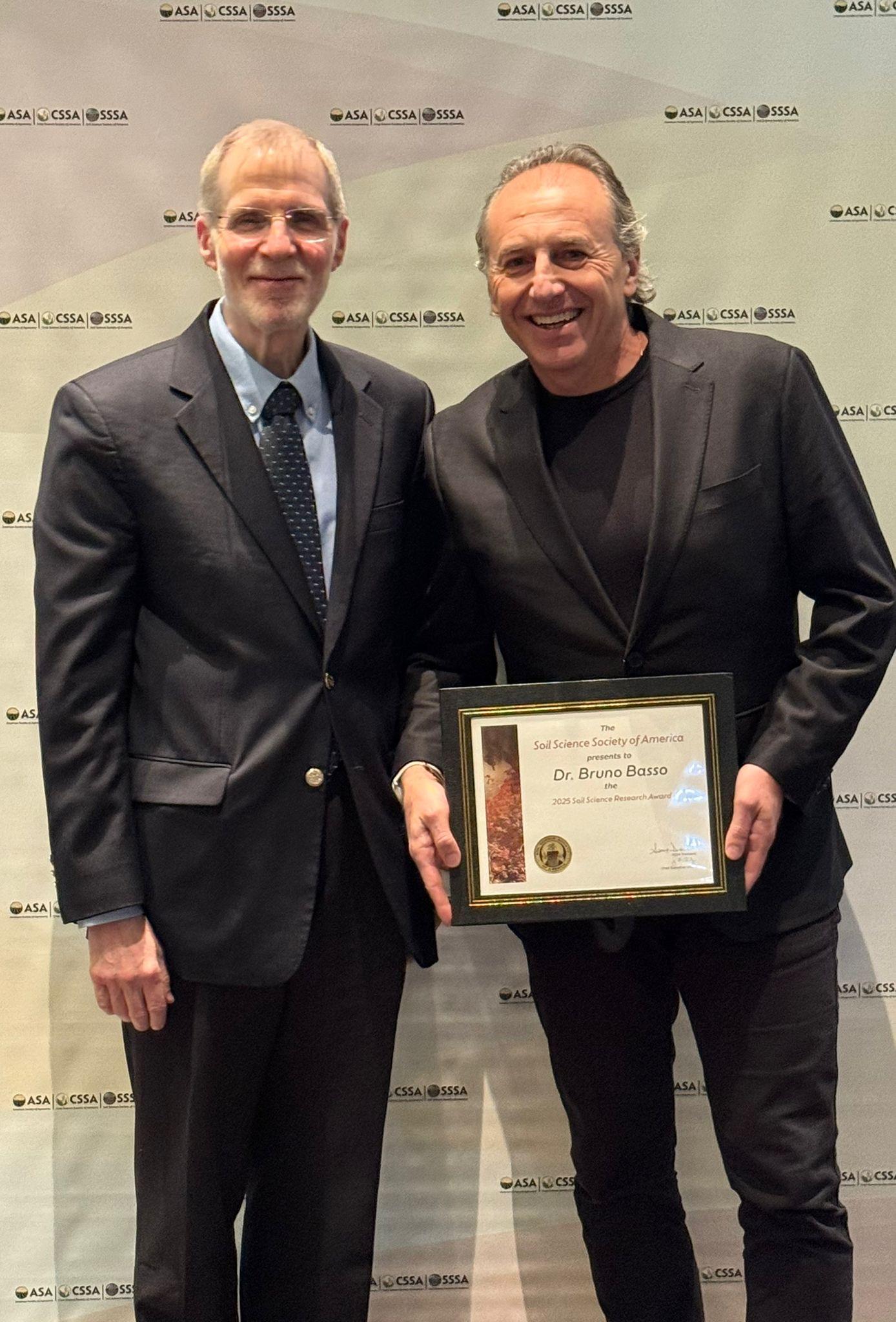MSU researcher honored with prestigious Soil Science Research Award
MSU AgBioResearch scientist Bruno Basso was recently awarded the Soil Science Research Award from the Soil Science Society of America.
SALT LAKE CITY, Utah — A Michigan State University researcher has received the Soil Science Research Award from the Soil Science Society of America (SSSA), one of the highest honors for advancing scientific knowledge in the field.
Bruno Basso, a world-renowned expert in sustainable agriculture and precision agriculture systems, was presented with the award Nov. 10 at the SSSA’s CANVAS conference in Salt Lake City, Utah.

Basso is a John A. Hannah Distinguished Professor in the MSU departments of Earth and Environmental Sciences, and Plant, Soil and Microbial Sciences, as well as the W.K. Kellogg Biological Station. His work is also supported in part by MSU AgBioResearch.
The Soil Science Research Award recognizes outstanding contributions to soil science, including unusual research creativity, excellence in reasoning ability and technical skill, and originality and significance to basic soil science.
“It’s an honor to receive this award from the SSSA, as I’ve dedicated my career to soil science and better understanding how we can improve soil health long term,” Basso said. “Soil is life, and we need to continue to improve its health. Healthy soils are an essential component of all environments, especially in agriculture. As growers and ranchers are tasked with producing more food on less land, it’s paramount that we’re good stewards of soil and view it as a precious, finite commodity.”
Basso’s research portfolio is wide-ranging, from using drones and satellites to monitor crop and soil health to leading efforts through the MSU Center for Regenerative Agriculture to promote sustainable farming practices.
With drones, Basso and his team employ sensors to measure plant nutrients, temperature and size. The information is plugged into his revolutionary Systems Approach to Land Use Sustainability program that models crop, nutrient, soil and water conditions over multiple years and various management strategies. The program compares management techniques over time under current and future climate scenarios.
Growers can then precisely determine how to apply the right amount of fertilizer at the right place and time, saving money on costly inputs and protecting the environment.
Basso has also developed several novel methods that glean key soil health insights, including an analysis metric known as yield stability zones. While routine soil sampling can prove prohibitively expensive for most farmers, Basso has paired soil samples with historical crop yield information and modeling to successfully identify distinct in-field variability based on relative soil organic carbon and relative soil health. The result can give farmers information on when and where to deliver nutrients and water as needed, while saving on application to higher-quality soil regions.
Recently, Basso published research aiming to more accurately calculate carbon credits, reducing possible errors that undermine trust in carbon markets and misrepresent climate benefits.
The research was published in Scientific Reports and included 46 million hectares of cropland throughout the U.S. Midwest. While many current carbon market systems use fixed baselines that fail to quantify soil carbon changes and emissions, Basso’s approach does both — utilizing multiple models that factor in changes due to regenerative agriculture practices such as cover crops, no tillage, crop rotations, adaptive grazing and agroforestry.
The overall goal of the project was to assure farmers that accurate data can be collected, thereby encouraging regenerative practices that are beneficial to the environment and to farmers’ businesses.
“All of my work is geared toward ensuring that we’re using the most efficient practices possible in agriculture to promote sustainability, making farmers sensitive to proper long-term decisions versus short-terms goals.” Basso said. “But there must be recognition that farmers will only adopt new strategies if they make sense economically. We’re showing that we accomplish both goals, and that’s exciting for the future of agriculture.”
Michigan State University AgBioResearch scientists discover dynamic solutions for food systems and the environment. More than 300 MSU faculty conduct leading-edge research on a variety of topics, from health and agriculture to natural resources. Originally formed in 1888 as the Michigan Agricultural Experiment Station, MSU AgBioResearch oversees numerous on-campus research facilities, as well as 15 outlying centers throughout Michigan. To learn more, visit agbioresearch.msu.edu.



 Print
Print Email
Email




